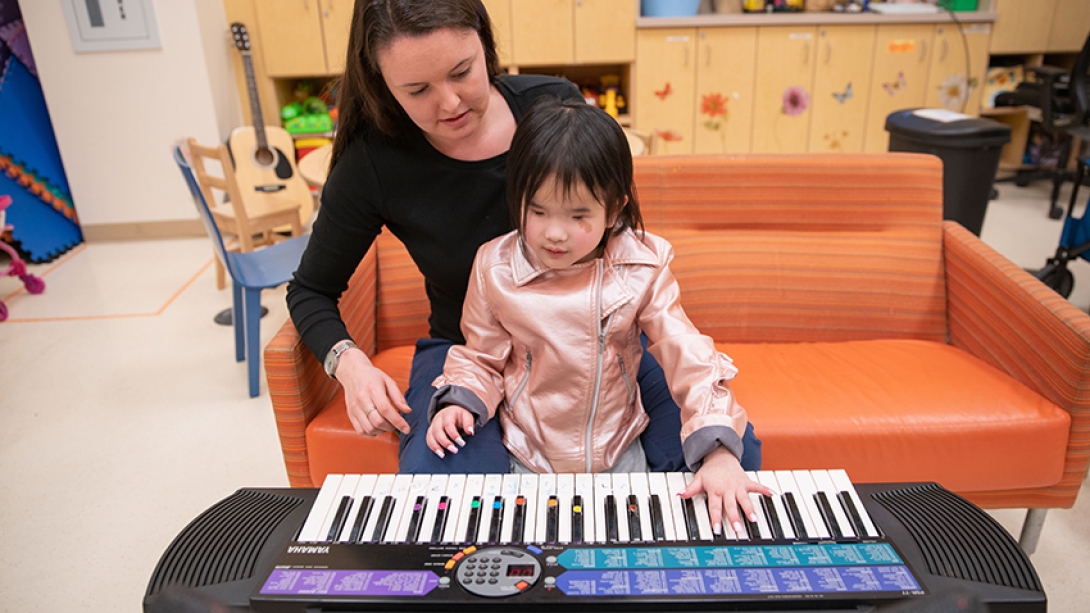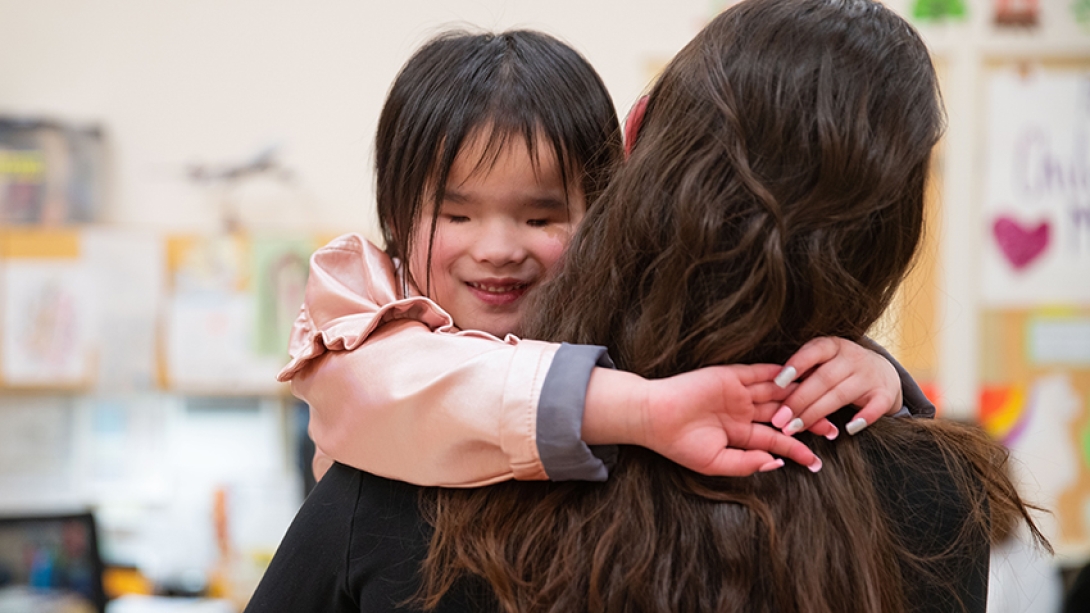Evie made international news with her rendition of “Scars to Your Beautiful” during seizure testing. Now, her family shares why music therapy has been vital in her journey.
11:00 AM
Author |
For 8-year-old Everlyse "Evie" Hurst, who was born without eyes and has always feared doctors and hospitals, even simple medical appointments are terrifying.
So when she recently needed seizure monitoring at University of Michigan C.S. Mott Children's Hospital — which involves a 30- to 60-minute process to get hooked up to an electroencephalogram (EEG) — she was so anxious that caregivers weren't sure they could complete the procedure.
But everything changed when Mott music therapist Emma Wymer walked in with a guitar. Recognizing Evie's anxiety, Wymer used music to help decrease Evie's fears. The two began singing together, starting with one of Evie's favorite songs, "Scars to Your Beautiful" by Alessia Cara.
LISTEN UP: Add the new Michigan Medicine News Break to your Alexa-enabled device, or subscribe to our daily audio updates on iTunes, Google Play and Stitcher.
She loves that so many people have watched it. She'll say, 'I'm famous.' She just has this little diva spirit in her and loves the spotlight.Katie Hurst, Evie's mom
Taking deep breaths, Evie began belting out the lyrics. "You should know you're beautiful just the way you are." The duo spent the next 40 minutes of the procedure singing, using music therapy to help Evie cope.
"As soon as a nurse or doctor even touches Evie, she has a major meltdown," says her mom, Katie Hurst. "But music makes her feel safe. "
"When Emma walked in, it was magical," she says. "Evie was able to calm down and just focus on singing."
MORE FROM MICHIGAN: Sign up for our weekly newsletter
And as she often does, Evie asked her mom to "please video this," something that her parents say brings their daughter comfort because she knows she can listen to the footage later.
Within days, that video clip — first covered by a television station from the family's hometown in Midland — was shared by millions across the world, including news sites in France, Australia, Italy, Belgium, Germany, England, Japan and even Evie's home country, China. The clip also caught the attention of singer and actress Sara Bareilles, Keala Settle from The Greatest Showman and Cara herself, who shared tweets about Evie and recently sent her a guitar as a gift.

The family now gets multiple messages a day from media outlets or people inspired by Evie, who herself frequently asks to listen to the video.
"She loves that so many people have watched it. She'll say, 'I'm famous,'" Katie Hurst says. "She just has this little diva spirit in her and loves the spotlight."
The second grader was also recently featured in a video to raise awareness for music therapy and Sophie's Place, an in-hospital music therapy studio that will open at Mott next year.
The studio will expand the music therapy program and offer children an interactive and inspiring music therapy space that will house instruments, a recording studio, broadcasting technology and even a stage for performances.
A long journey
Evie was born in China and adopted by Katie and Craig Hurst in 2015. Her medical history is still a mystery. She is undergoing tests as providers try to better understand her health issues.
The couple came across Evie's file while they were in the process of adopting Ellie, another little girl from China. They noticed that the two girls both looked similar, were the same age and had been born without eyes, a condition called anophthalmia. They wondered if they might be sisters.
Evie's prognosis was dire — she was severely malnourished, and her weight was plummeting. The couple, who already had three biological children and one adopted son, decided to adopt both Ellie and Evie and become a family of six.
By the time Evie left the orphanage at age 4, she weighed just 11 pounds, barely able to stand or sit up. Under the Hursts' care, she learned how to eat properly and began gaining healthy weight.
"Through quite a remarkable journey, God put Evie into our lives," Katie Hurst says. "She deserves to be known. She has such a bright light wherever she goes and just has the spirit of a survivor."
The power of music
Evie's love for music was obvious the first time the Hursts gave her a bath and she started giggling joyfully while singing a Chinese song. Music later helped her to learn English. And the couple found that singing songs or playing music on a phone helped her cope during uncomfortable situations, like going to the dentist or riding an elevator.
"Evie can walk into a hospital setting and know she's there without seeing it. She will scream and cry, and it becomes really intense," Katie Hurst says. "She has trauma from her past experiences with hospitals and doctors, but we don't know the history behind it.
"Being blind, there's the fear of the unknown, not knowing who is in the room or what is happening," she says.
So the Hursts anticipated challenges when they brought Evie to the emergency room at Mott this year because she was having seizures at school.
"Once music was introduced to her environment, it was almost like a switch was flipped," music therapist Wymer says. "She was able to redirect her focus from what was going on that was frightening to her to the music she was singing, which calmed her. For a lot of kids at the hospital, I find that music helps keep their minds elsewhere to get through what may feel like a scary situation."
Wymer returned to sing with Evie over the next few days at Mott. Evie even went home with an aqua ukulele with braille stickers to mark chords.
"Evie just gravitates towards Emma. She knows her voice and connects her to a positive experience at the hospital," Katie Hurst says. "They just have this deep connection through their love for music."
Evie's pediatric neurologist, Erin Fedak Romanowski, D.O., of the Mott Comprehensive Pediatric Epilepsy Program, says there were concerns that Evie might have a neurologic and endocrine condition that could put her at risk for seizures, developmental delay and endocrine abnormalities.
Indeed, the EEG tests found that Evie is at risk of seizures.

"Hospitalization can be overwhelming for any child, but especially one who can't see who she is meeting or what is being done to her," Fedak Romanowski says. "Our medical team was conscientious about explaining who we were and what we planned to do before we did it, to alleviate Evie's anxiety. I am proud to be part of a team that could make her experience less scary, but the real star is Evie."
"I knew Evie was brave and special the moment I met her, but wow, she can sing," she says. "Her voice gave me chills and, like many others, brought tears to my eyes. It was inspiring to see how music calmed her so quickly and helped her forget her anxiety of being in the hospital undergoing a strange test."
Normalizing the hospital environment
Today, Evie's favorite toy is the Echo Dot, which she uses daily to instruct Alexa to play her favorite songs.
Katie Hurst hopes Evie's story continues to promote the importance of music therapy.
"Music is an international language," she says. "It breaks down barriers and supports emotional health in a way a pill can't.
"Music therapy is a must for kids like Evie. I hope and pray that through positive experiences connecting medicine to what she loves most — music — she will someday be OK going to see a doctor. Music is medicine."

Explore a variety of healthcare news & stories by visiting the Health Lab home page for more articles.

Department of Communication at Michigan Medicine
Want top health & research news weekly? Sign up for Health Lab’s newsletters today!





